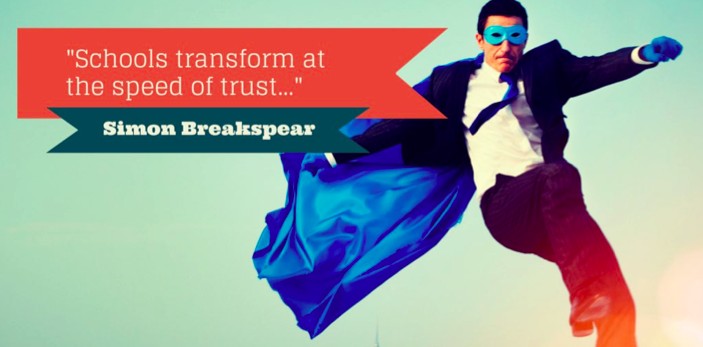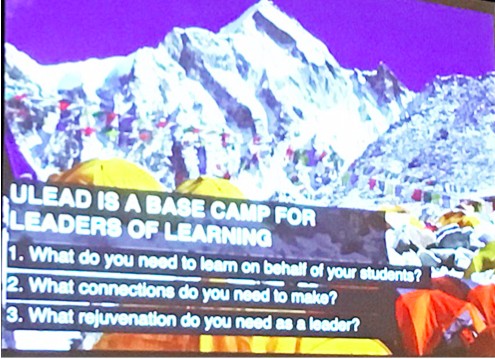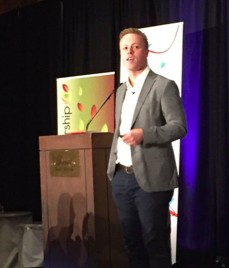Lors du Sommet sur le leadership en éducation uLead, tenu à Banff du 24 au 27 avril 2016, il a été longuement question de changement et des façons de l’amorcer. Voici quelques notes à propos de l’établissement de « camps de base ».
Jón Torfi Jónasson est professeur à la Faculté des sciences de l’éducation de l’Université d’Islande. Lors de l’événement uLead 2016, il a insisté sur l’importance de comprendre d’où nous venons pour amorcer un changement. En effet, comme notre système scolaire actuel provient du 18e siècle, il est normal qu’il soit en changement. Amorcer le mouvement n’est jamais facile au départ, mais une fois que quelques pas sont faits, il est possible d’établir un « camp de base » où l’on pourra accueillir d’autres personnes motivées à se joindre à nous.
Dans le même ordre d’idées, Simon Beakspear a qualifié l’événement uLead comme l’un de ces camps de base. Bien sûr, lorsque quelques 1140 leaders du milieu de l’éducation se réunissent pour questionner, partager et réfléchir sur les différents systèmes en place et en évolution à travers le monde, des étincelles se transforment rapidement en majestueux éclairs.
Creating Agile Schools – Setting up our schools to embrace change and adapt to the future, Simon Breaspear, uLead 2016.
Comment reproduire dans son milieu un tel sentiment de confiance, de mobilisation vers un objectif commun, celui d’améliorer l’apprentissage des élèves en effectuant un profond changement pédagogique? Un « camp de base » a pour but de valoriser les initiatives des enseignants. Il peut s’agir d’une série de « midis-pédagos », un journal enseignant mensuel, un mur de partage de découvertes, etc.
Par où commencer? Selon Simon Breakspear, trois principes se trouvent à la base d’un mouvement efficace :
- Maximiser l’impact en faisant peu, mais en le faisant mieux. Établir les priorités en fonction du milieu et chercher les rétroactions pour s’ajuster rapidement.
- Accroitre l’expertise du personnel en favoriser la formation continue menant à des spécialisations du personnel en place. Les éducateurs devront savoir comment plus que savoir quoi.
- Développer l’efficacité collective de l’équipe en disciplinant la collaboration. S’assurer de se concentrer sur la solution et non sur le problème.
La trame de fond de cette démarche, qui est tout aussi importante que la procédure elle-même, s’oriente ainsi : débuter à petite échelle, apprendre rapidement, savoir échouer pour s’améliorer. Ne sont-ce pas là les mêmes attentes que nous avons envers nos élèves?
Par exemple, pour faire du vélo, il faut regarder plus loin que la roue avant. Ne craignons donc pas de risquer la complexité, de regarder plus loin. Aussi, il est nécessaire de pédaler continuellement pour garder l’équilibre : demeurons donc en mouvement, avançons. Finalement, quelqu’un qui nous pousse, nous tire et nous encourage est toujours le bienvenu, alors soyons cette personne pour nos collègues!
Creating Agile Schools – Setting up our schools to embrace change and adapt to the future, Simon Breaspear, uLead 2016.
Si vous souhaitez promouvoir ce genre de développement professionnel pour vos enseignants, nul besoin de se rendre en Alberta. Suggérez-leur de participer aux soirées USPPP (Un souper pédagogique presque parfait), aux formations de Cadre21, aux congrès tels que celui de l’AQUOPS (Association québécoise des utilisateurs de l’ordinateur au primaire et au secondaire), le REFER (Rendez-vous des écoles francophones en réseau), le Sommet de l’iPad et du numérique en éducation, les edCamps etc. Une foule de possibilités s’offrent à nous!









